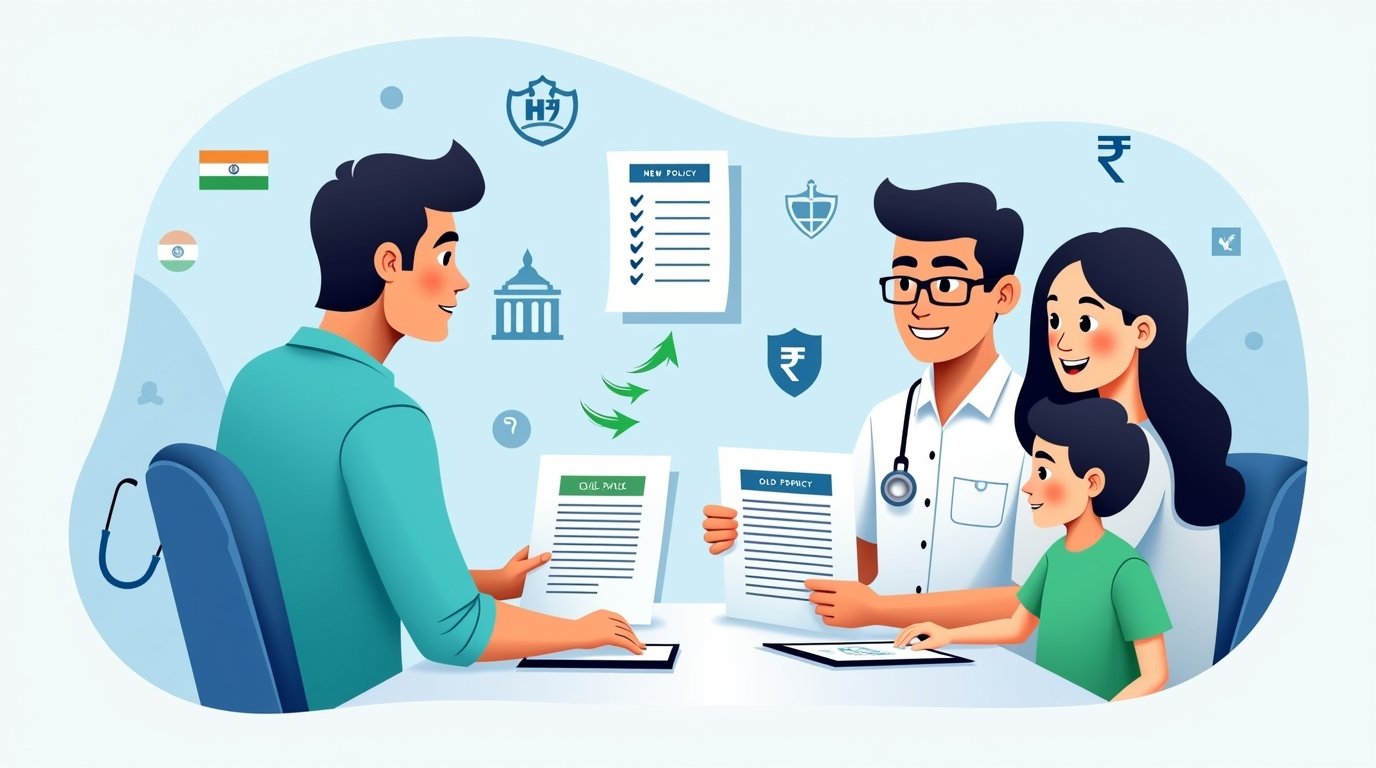Struggling with a health insurance policy that doesn’t meet your needs? Rising premiums, limited coverage, or poor claim settlement experiences can leave you feeling trapped. Fortunately, porting your health insurance policy in India offers a solution, allowing you to switch insurers without losing key benefits like your no-claim bonus or waiting period credits. This comprehensive guide will walk you through the process, ensuring you make an informed decision while adhering to the Insurance Regulatory and Development Authority of India (IRDAI) guidelines. By the end, you’ll know exactly how to port your policy, avoid common pitfalls, and secure better coverage in 2025.
Why Port Your Health Insurance Policy?
Porting your health insurance policy means transferring your existing policy to a new insurer while retaining benefits like waiting period credits for pre-existing conditions and no-claim bonuses. This process is particularly valuable if your current insurer fails to deliver on coverage, customer service, or affordability.
Key Reasons to Port
- Rising Premiums: If your premiums are increasing disproportionately without added benefits.
- Inadequate Coverage: Your policy lacks coverage for critical illnesses or modern treatments.
- Poor Claim Experience: Frequent claim rejections or delays in settlements.
- Better Options Available: Newer policies offer enhanced features like OPD coverage or wellness benefits.
Real-World Example: Priya, a 35-year-old professional from Mumbai, was frustrated with her insurer’s limited hospital network and high co-pays. By porting to a new insurer, she gained access to a wider network and reduced out-of-pocket expenses, all while retaining her 4-year no-claim bonus.
Understanding the Portability Process
The IRDAI introduced health insurance portability in 2011 to empower policyholders. Porting allows you to switch insurers without losing continuity benefits, provided the new policy offers similar or better coverage.
Eligibility for Porting
- You must have an active health insurance policy.
- Porting is allowed only at the time of policy renewal.
- Both individual and family floater policies are eligible.
- The new insurer must offer a comparable policy.
When to Initiate Porting
You must apply for portability at least 45 days before your current policy expires. This gives the new insurer enough time to process your request and underwrite the policy.
Step-by-Step Guide to Port Your Health Insurance Policy
Porting your health insurance policy in India is straightforward if you follow these steps:
Step 1: Research and Compare Policies
Start by evaluating policies from different insurers. Focus on:
- Coverage: Look for policies covering critical illnesses, daycare procedures, and modern treatments like robotic surgeries.
- Network Hospitals: Ensure the insurer has a wide network of cashless hospitals near you.
- Premiums and Features: Compare premiums, co-pay clauses, and additional benefits like wellness programs.
- Claim Settlement Ratio: Choose insurers with a high claim settlement ratio (above 90%) for reliability.
Tip: Use comparison platforms like Policybazaar or Coverfox to shortlist policies.
Step 2: Contact the New Insurer
Once you’ve chosen a new insurer, approach them with your intent to port. Provide:
- Your existing policy details (policy number, sum insured, etc.).
- Medical history and claim records.
- Details of add-ons or riders you wish to include.
Step 3: Submit the Portability Application
Complete the portability application form provided by the new insurer. You’ll also need to submit:
- A copy of your current policy document.
- Previous policy documents (at least the last 2 years).
- Medical records, if applicable.
- A duly filled IRDAI portability form (available on the insurer’s website).
Step 4: Underwriting Process
The new insurer will assess your application, medical history, and claim records. They may:
- Approve the porting without additional conditions.
- Request a medical check-up (especially for senior citizens or those with pre-existing conditions).
- Apply a loading on premiums if you have a high-risk profile.
Step 5: Policy Issuance
Once approved, the new insurer will issue the policy. Pay the premium, review the policy document, and ensure all benefits (like waiting period credits) are transferred correctly.
Step 6: Notify the Current Insurer
Inform your current insurer about your decision to port. They are obligated to share your policy and claim history with the new insurer within 7 days.
Case Study: Anil, a 42-year-old from Delhi, ported his family floater policy after his insurer repeatedly delayed claim settlements. By researching and choosing a policy with a 95% claim settlement ratio, he secured better coverage and faster claims processing.
Documents Required for Porting
Here’s a handy table summarizing the documents you’ll need:
| Document | Purpose |
|---|---|
| Current Policy Document | Verify coverage and policy details |
| Previous Policy Documents | Prove continuity for waiting period credits |
| IRDAI Portability Form | Formal request for porting |
| Medical Records | Assess pre-existing conditions (if applicable) |
| Claim History | Evaluate past claims for underwriting |
| Identity Proof | KYC compliance |
What’s New in 2025 for Health Insurance Porting?
The IRDAI has introduced several updates to make porting more seamless in 2025:
- Standardized Portability Process: Insurers must now follow a uniform timeline for processing portability requests (within 15 days).
- Enhanced Transparency: Insurers are required to disclose claim settlement ratios and hospital networks upfront.
- Digital Porting: Many insurers now offer online portals for submitting portability applications, reducing paperwork.
- Wider Coverage Options: New policies include coverage for mental health, teleconsultations, and alternative therapies like Ayurveda.
Suggested Visual: A flowchart illustrating the step-by-step porting process for better clarity.
Pros and Cons of Porting Your Health Insurance Policy
| Pros | Cons |
|---|---|
| Retain waiting period credits and no-claim bonuses | Possible premium loading for high-risk profiles |
| Access to better coverage and hospital networks | Limited to similar or higher sum insured policies |
| Improved claim settlement experience with a reliable insurer | May require fresh medical check-ups for certain cases |
| Flexibility to choose policies with modern features like OPD coverage | Slight delays if current insurer delays sharing policy details |
Common Mistakes to Avoid When Porting
- Not Comparing Policies: Choosing the first available policy without research can lead to poor coverage.
- Missing the 45-Day Window: Late applications may delay or derail the process.
- Incomplete Documentation: Missing documents can lead to rejection by the new insurer.
- Ignoring Fine Print: Overlooking co-pay clauses or exclusions can result in unexpected costs.
Internal Link: Learn more about choosing the right health insurance policy for your needs.
FAQ Section
1. What is health insurance portability in India?
Health insurance portability allows policyholders to switch their existing health insurance policy to a new insurer without losing benefits like waiting period credits or no-claim bonuses. Governed by IRDAI guidelines, it ensures continuity of coverage, provided the switch happens at renewal time. For example, if you’ve completed a 3-year waiting period for pre-existing conditions, the new insurer must honor it.
2. Can I port my health insurance policy mid-term?
No, you can only port your health insurance policy at the time of renewal. You must apply at least 45 days before your policy expires to allow the new insurer sufficient time to process your request. Planning ahead ensures a smooth transition without coverage gaps.
3. Will my premium increase after porting?
Your premium may increase or decrease depending on the new policy’s features, sum insured, and your risk profile. For instance, if you opt for a policy with higher coverage or add-ons, the premium may rise. Conversely, choosing an insurer with competitive rates could lower it. Always compare quotes before deciding.
4. What happens to my no-claim bonus after porting?
Your no-claim bonus (NCB) is transferable to the new insurer, provided there’s no break in coverage. The new insurer will factor in your NCB when calculating premiums or sum insured. Ensure the new policy document reflects this benefit accurately.
5. Can I port a family floater policy?
Yes, family floater policies can be ported just like individual policies. The process remains the same, and all members covered under the policy will retain their waiting period credits and other benefits. Ensure the new insurer offers a comparable floater plan.
6. What if the new insurer rejects my portability request?
If the new insurer rejects your request (e.g., due to medical history or underwriting issues), you can continue with your existing policy or approach another insurer. To avoid rejections, provide complete and accurate documentation and choose a policy that aligns with your current coverage.
External Link: For detailed IRDAI guidelines, visit IRDAI’s official website.
Conclusion
Porting your health insurance policy in India is a powerful way to secure better coverage, lower premiums, and a smoother claim experience. By researching policies, submitting complete documentation, and adhering to the 45-day timeline, you can make a seamless transition to a new insurer in 2025. Avoid common mistakes like missing deadlines or overlooking policy fine print to ensure a hassle-free process. Have questions or experiences to share? Drop a comment below or sign up for our newsletter for more insurance tips!


1 thought on “How to Port Your Health Insurance Policy in India”